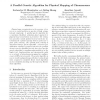Free Online Productivity Tools
i2Speak
i2Symbol
i2OCR
iTex2Img
iWeb2Print
iWeb2Shot
i2Type
iPdf2Split
iPdf2Merge
i2Bopomofo
i2Arabic
i2Style
i2Image
i2PDF
iLatex2Rtf
Sci2ools
129
click to vote
CSB
2003
IEEE
2003
IEEE
A Parallel Genetic Algorithm for Physical Mapping of Chromosomes
Physical map reconstruction in the presence of errors is a central problem in genetics of high computational complexity. A parallel genetic algorithm for a maximum likelihood estimation-based approach to physical map reconstruction is presented. The estimation procedure entails gradient descent search for determining the optimal spacings between probes for a given probe ordering. The optimal probe ordering is determined using a genetic algorithm. A two-tier parallelization strategy is proposed wherein the gradient descent search is parallelized at the lower level and the genetic algorithm is simultaneously parallelized at the higher level. Implementation and experimental results on a network of shared-memory symmetric multiprocessors (SMPs) are presented. The genetic algorithm is seen to result in physical maps with fewer contig breaks when compared to simulated Monte Carlo algorithms such as simulated annealing and the large-step Markov chain algorithm.
Related Content
| Added | 04 Jul 2010 |
| Updated | 04 Jul 2010 |
| Type | Conference |
| Year | 2003 |
| Where | CSB |
| Authors | Suchendra M. Bhandarkar, Jinling Huang, Jonathan Arnold |
Comments (0)

